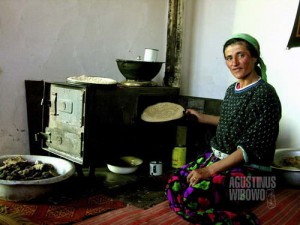Murghab – The Dudkhoda’s Family
Boys of Murghab, in front of Tajik banner with the tricolor flag and coat-of-arms, of which important element is a snow mountain “Pamir will be better…. Pamir will be better….” – Dudkhoda My first impression of this 39 year old Tajik man was really not so good. this man tried to hug me and kiss me when I was sleeping next to him under the same blanket on the floor in the Kyrgyz restaurant in alichur packed by the Kyrgyz drivers. He also made me to pay his bills in the restaurant. But later I found that he had story worth to tell. He arranged for me a seat in the Kyrgyz truck, along with him, who returned to his home in Murghab. He was actually a passenger of the truck, not being able to pay the ride with money but offered the drivers a dinner in his hosue in Murghab. I came along with him, sitting along the way to Murghab (100 km) for free. Just near Murghab, there were two military checkpoint. The Kyrgyz drivers failed to do registration and they became [read more]

